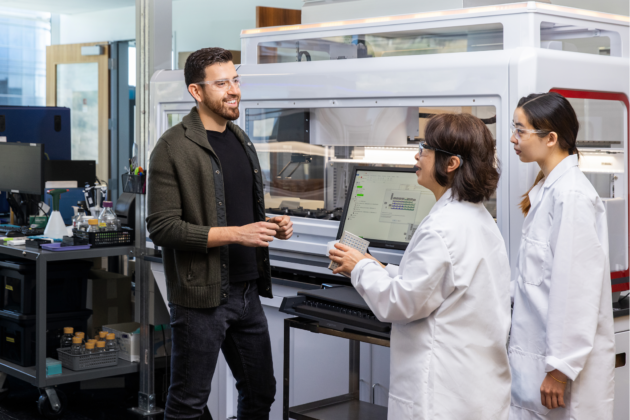
‘Fermed’ proteins are changing the food landscape
By Nithya Caleb
Food Trends Dairy Ingredients & Additives Specialty Foods Editor pick Good Food Institute IFT Liven Proteins New Culture Perfect Day Precision fermentation Saskatchewan Food Industry Development Centre The Every CompanyWith a lot of precision, fermentation is creating novel products while addressing climate change
 New Culture debuts its animal-free cheese at Los Angeles-based Pizzeria Mozza in celebration
of a partnership launch with Nancy Silverton. Photo © New Culture
New Culture debuts its animal-free cheese at Los Angeles-based Pizzeria Mozza in celebration
of a partnership launch with Nancy Silverton. Photo © New Culture This summer, at the IFT FIRST trade show, I had the opportunity to sample Perfect Day’s ice cream and barista milk. U.S.-based Perfect Day is revolutionizing the dairy industry with its animal-free milk protein made by precision fermentation. The company claims its whey protein makes dairy products “more sustainable and just as craveable, creamy, whippable, spreadable, and delicious.”
Earlier this spring, California-based New Culture unveiled its animal-free mozzarella cheese. New Culture uses precision fermentation to make the casein protein that gives cheese its distinctive ability to shred, stretch, crumble, and melt.
Perfect Day’s mission is to build “a kinder, greener tomorrow” and New Culture wants to create a “more sustainable food system that has a lighter, less harmful imprint on the world, and a kinder relationship with animals.”
A similar aspiration is the driving force behind the Every Company’s ‘fermed’ animal-free egg proteins, made using yeast and sugar.

Perfect Day’s founders Ryan Pandya and Perumal Gandhi. Photo © Perfect Day
Defining precision fermentation
Precision fermentation is the technology that’s helping these companies achieve their goals. You’re probably wondering what the heck is precision fermentation. Well, “precision fermentation has at its core synthetic biology. It is essentially based on recombinant DNA technology, which has been around for many decades. Microbes are engineered to produce a single product. What is exciting nowadays is that we can produce complex molecules in these cell factories to create foods for human consumption. The microbes themselves are not consumed; only the products which are released or extracted from them,” explained Mehmet Caglar Tulbek, PhD, president, Saskatchewan Food Industry Development Centre (the Food Centre).
The Food Centre is building a new fermentation facility with scale up production of up to 20,000 L to cater to the demand for some intermediate level of production. This facility will act as a bridge for companies to test and produce their precision fermentation products and assess commercial success prior to establishing their own large-scale production facilities.
“Precision fermentation is just basically adding a little bit of precision to the fermentation process. In that sense it is very similar to brewing beer. You use a micro-organism, such as yeast or bacteria. The micro-organism is typically engineered by adding additional pieces of genetic code or protein. Instead of brewing alcohol, you’re actually making the targeted protein or chemical from it. In the context of food industry, we will be making alternative protein, for example, or flavours and fragrances,” added Fei Luo, co-founder and CEO, Liven Proteins, Mississauga, Ont. Liven makes animal-free protein ingredients like collagen using precision fermentation.
As you can see, precision fermentation has diverse applications. Per Good Food Institute, “Precision fermentation can produce enzymes, flavouring agents, vitamins, natural pigments, and fats.” It is also not a new technology. Precision fermentation-based rennet has been used for more than 30 years. Today, as Luo said, 99 per cent of mozzarella in the world is made using precision fermentation-based rennet.

Arturo Elizondo, co-founder and CEO of the Every Company, with his employees. Photo © the Every Company
Perfect Day’s and New Culture’s ingredients aren’t available in Canada, but most of us are familiar with Impossible Foods. Heme, which gives Impossible Beef its ‘meaty’ taste, is made via “fermentation of genetically engineered yeast.”
Potential
Many food industry professionals believe precision fermentation is going to help us meet the arduous task of feeding nine billion people by 2050 while addressing the loss of arable lands due to global warming as well as reducing greenhouse gas emissions from animal farming.
“It can address a lot of our current concerns relating to environmental sustainability since land and water resources use can be minimized. Additionally, precision fermentation will allow production of more healthy and nutritional foods with natural flavours, aroma, tastes, vitamins, and many of the components of plant-based alternative meat without chemical additives,” said Tulbek.
A good example of this would be collagen, the protein that Liven biomanufactures. Typically, collagen or gelatin is made by crushing cow or fish bones or fish scales, boiling it in strong acids and then using a separation process.
“This conventional process is not sustainable. It is also polluting if you’re thinking about the wastewater generated from it. By using precision fermentation, we will be able to make this protein without relying on the animal industry,” explained Luo. “It is a game changer for the supply chain because the animal industry is vulnerable to climate change as well as diseases. The source of the collagen material is volatile. For example, marine collagen is consumed worldwide, but a lot of times, fish have heavy metal issues because of what we did to the ocean. Also, fish is an allergen. So, by [using] this brewing process, you’re basically getting the same protein that’s conventionally made from animals without heavy metal contamination or viruses and allergens. You will also be able to craft design the protein. If you harvest the protein from animals, you don’t have a choice. When we precisely brew this protein, we can actually design the genetic code needed to give the protein the required functionality.”

Cream cheese made with Perfect Day’s whey protein. Photos © Perfect Day
We are hearing a lot about precision fermentation in the alternative protein space these days because it can address many of the pain points in the animal industry.
“In 2050, we will have a $1 trillion protein deficit. We can eat plant-based foods but unfortunately, we cannot really make the whole world eat lentil soup. Precision fermentation holds the potential of making animal proteins without animals,” said Luo.
Further, the technology has also been around for a long time and has proven to be safe for food production, as Dr. Amy Proulx explains in her column on Pg 8.
Indeed, as Tulbek said, “precision fermentation is opening new opportunities for Canadian companies to contribute to healthy and nutritious food and the Food Centre is helping to advance this technology. It can also be used to contribute to a circular economy by engineering microbes to derive value from waste feedstocks coming from breweries, grain processing industries, where additional proteins, sugars, vitamins, bioactive compounds can be recovered, thereby reducing wastes going to landfills.”

A pound cake with protein by the Every Company. Photo © the Every Company
Challenges
However, the technology is expensive. The major challenge will be to keep production costs economical so that ‘fermed’ products are affordable for the public.
“Precision fermentation requires highly specialized equipment for production at large scales in the order of 100,000 to 1 million L capacities for sustainable, economical, and routine production. For many of the SMEs, the cost of establishing such infrastructure may be prohibitive,” explained Tulbek.
“A lot of capacity building needs to be done to reach price parity with animal proteins. Investments and funding are required because precision fermentation needs upfront financing. The regulatory landscape is also not very transparent right now,” added Luo, who also stressed on the need to develop the talent required to power Canada’s bioeconomy.
One can’t ignore the significance of consumer education. Unless consumers perceive ‘fermed’ products as safe, nutritious, clean label, this tech will not create the impact that has become its major selling point.
This article was originally published in the August/September 2023 issue of Food in Canada.
Print this page